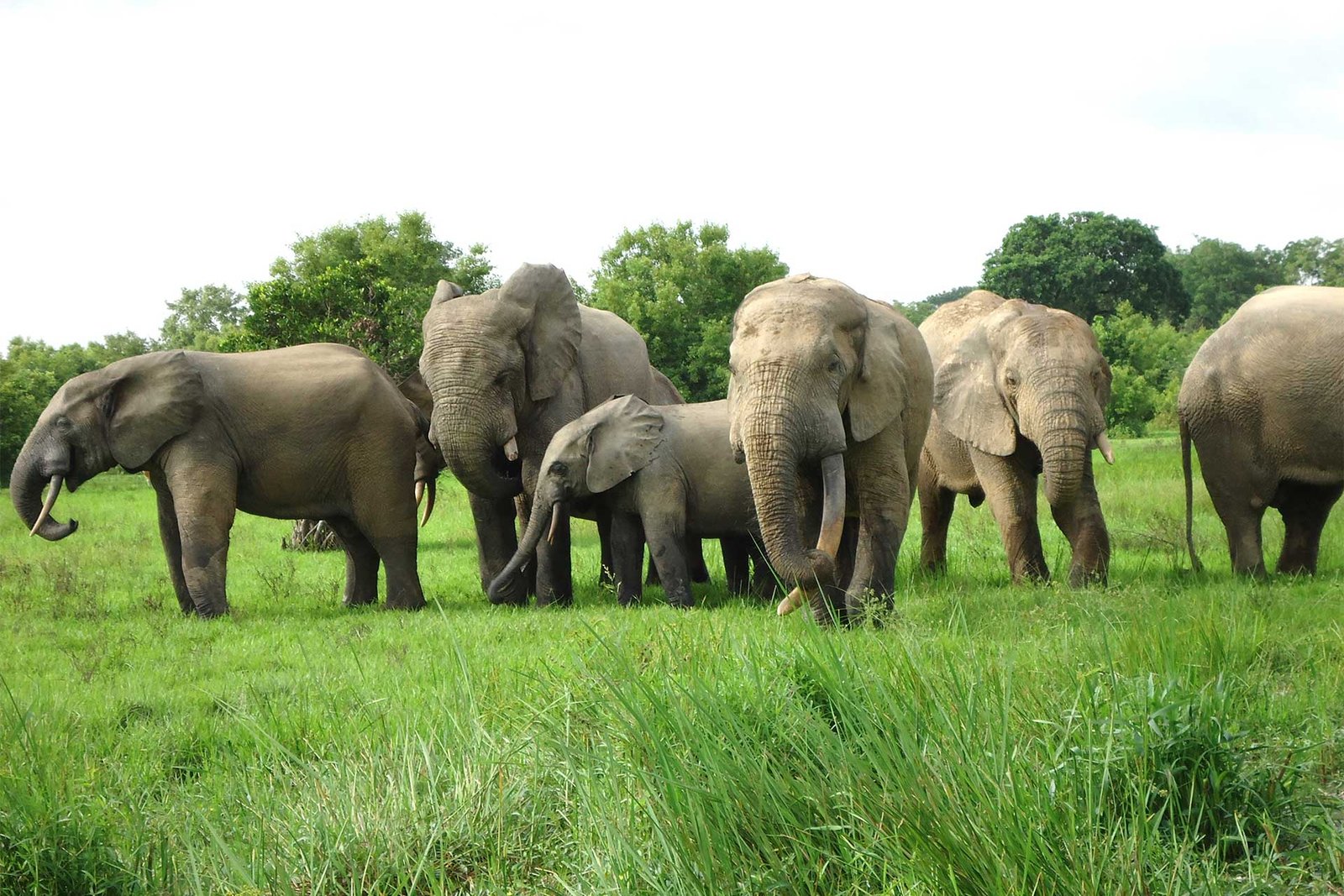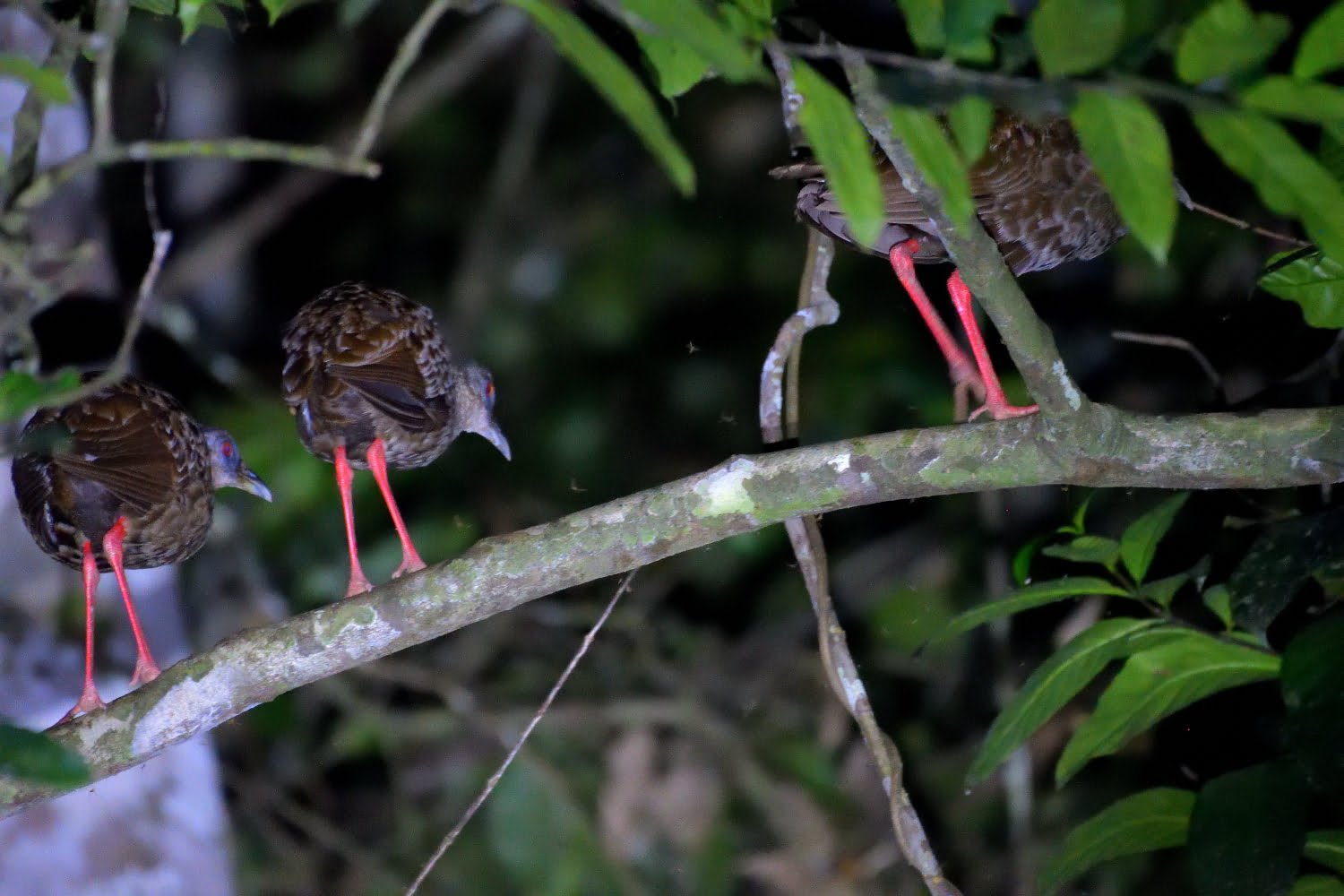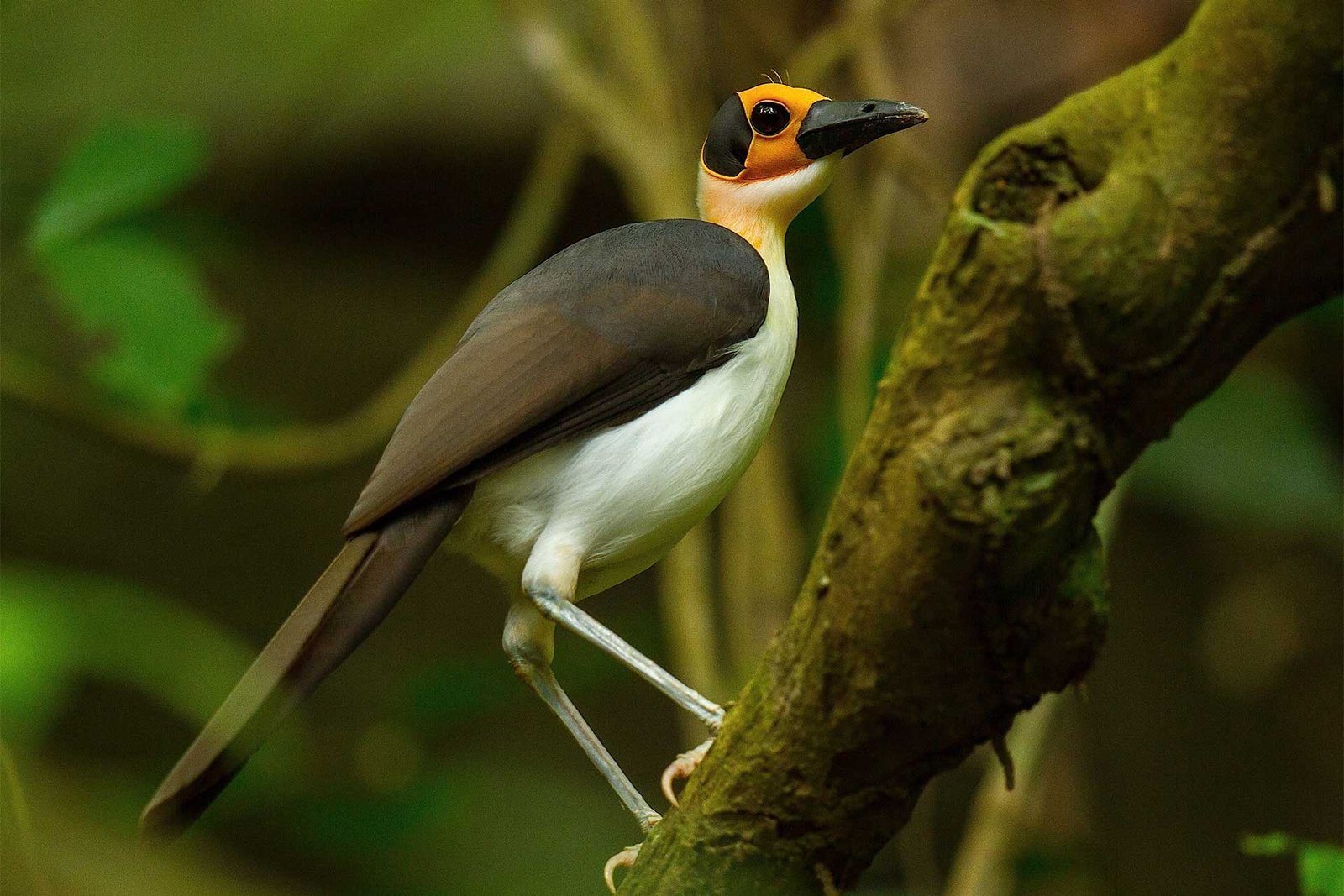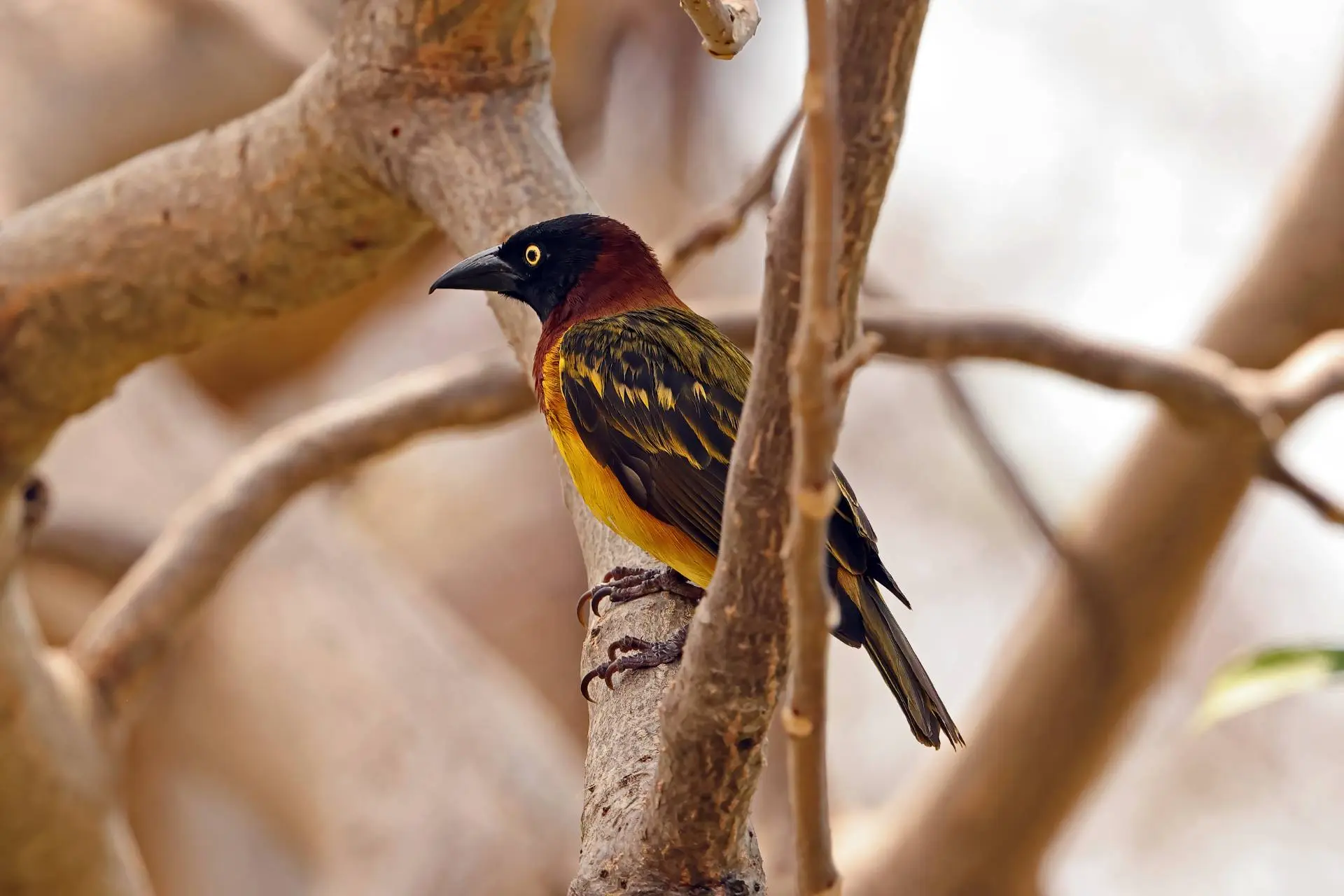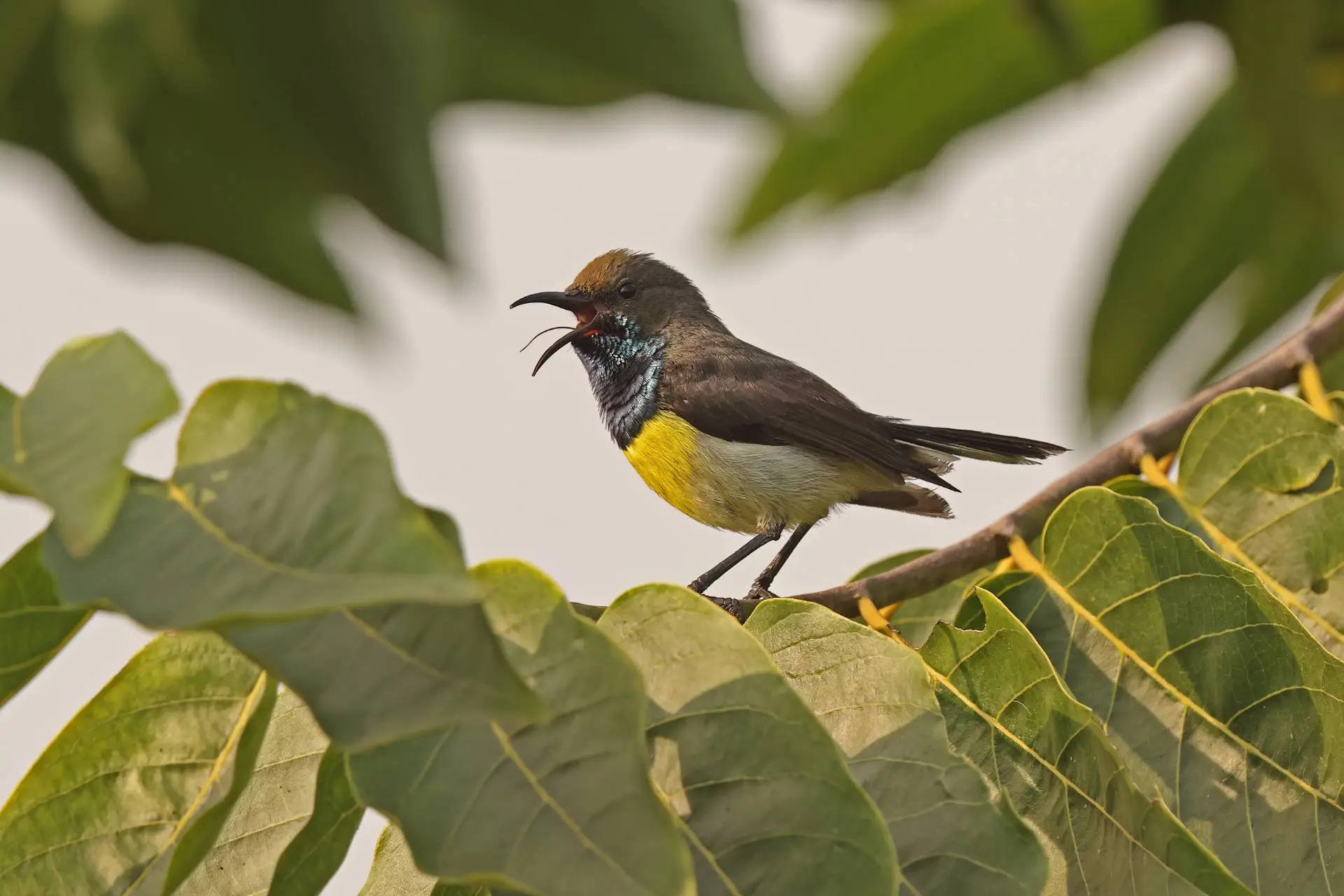Ghana Birding & Nature Tour
17 Days
Track Endemics from Rainforest Canopies to Savannah Plains
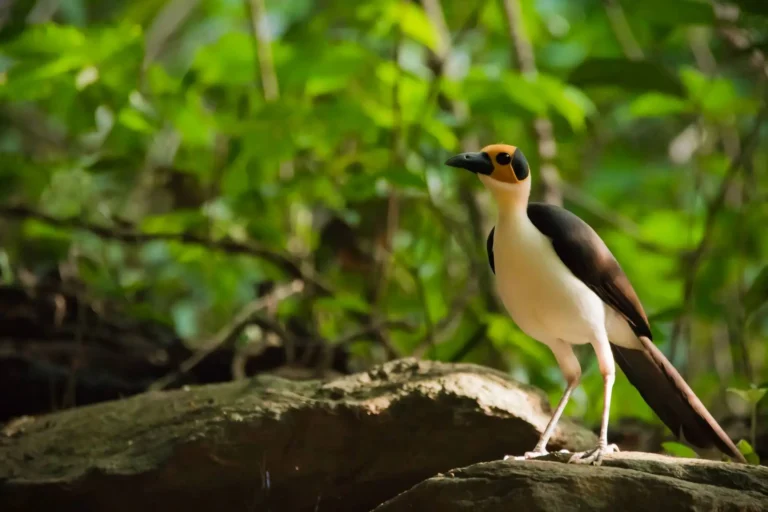
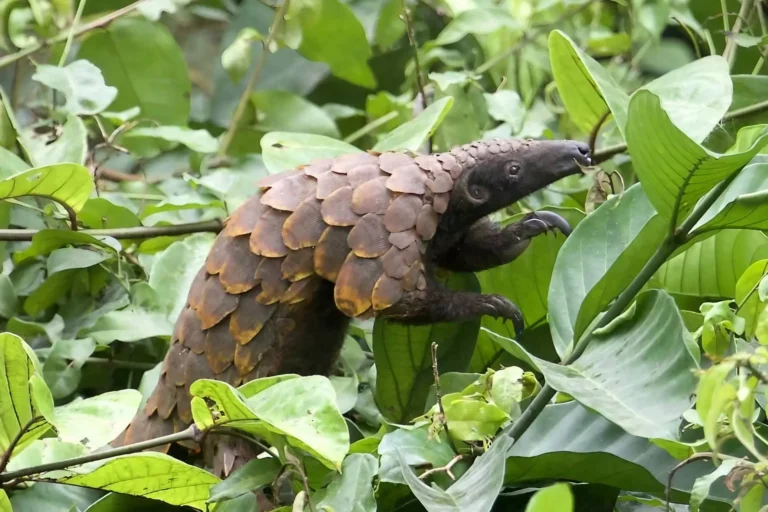
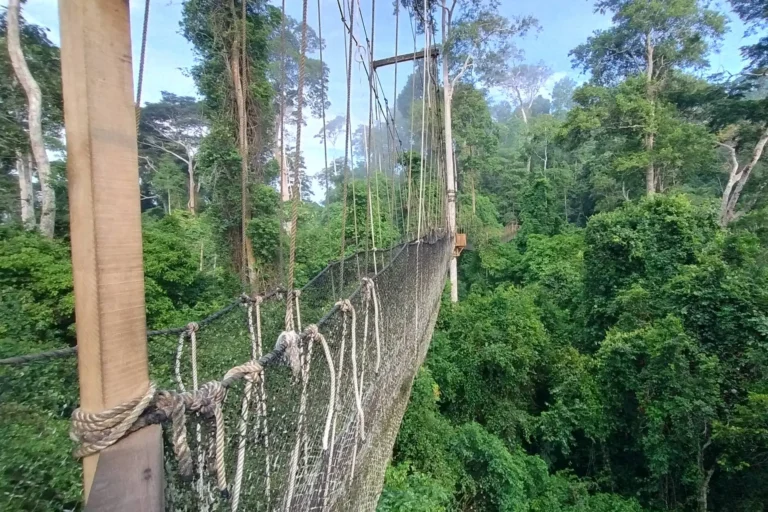
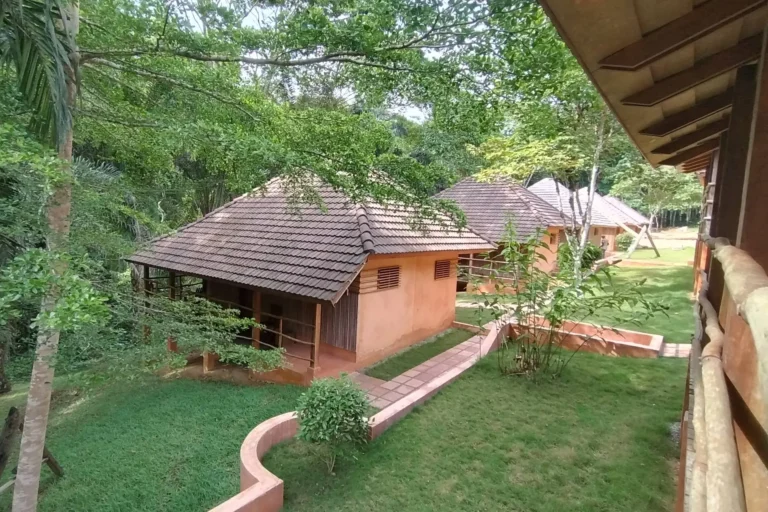
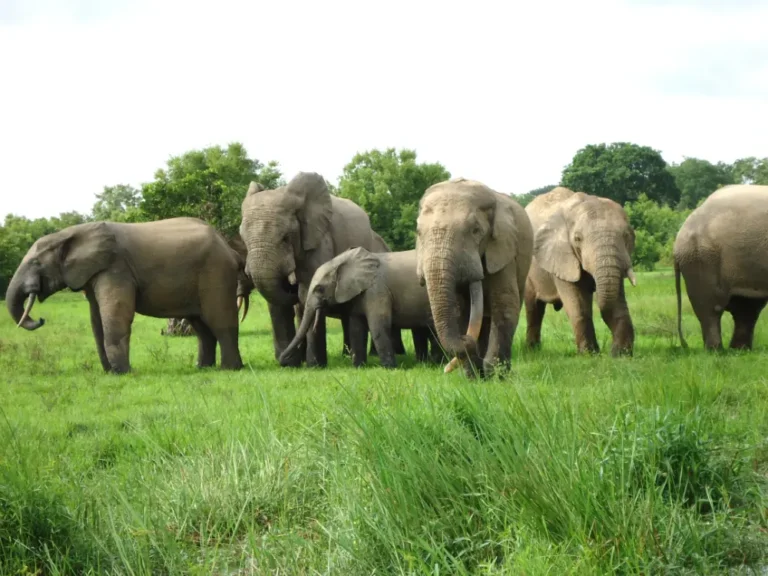
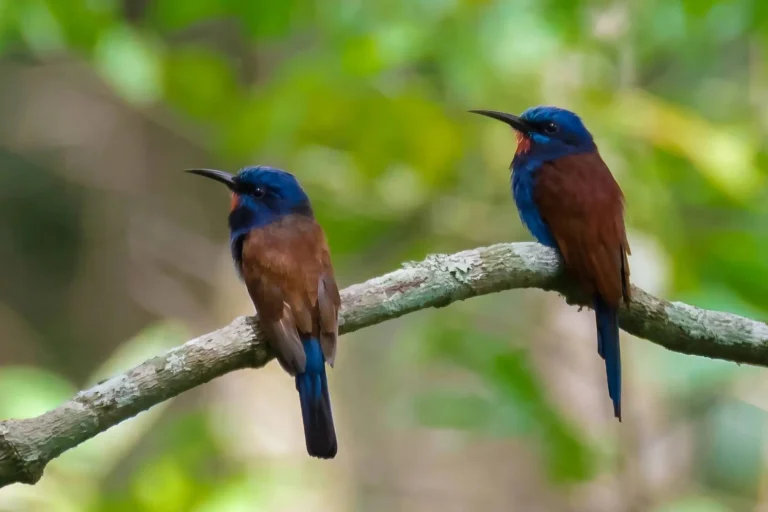
DESTINATION
ACTIVITY
DURATION
17 Days
GRADE
Moderate
GROUP SIZE
Can be tailored to any group size
Highlights
- Birding Shai Hills Reserve, Sakamona Lagoon, and transfer to Kakum National Park.
- Birding Kakum National Park with morning and evening visits to the canopy walkway.
- Birding Antwikwaa and Kakum National Park.
- Birding Kakum Forest and Ankasa Reserve.
- Brenu Akyinim.
- Birding Abrafo Forest and Picathartes Nesting Site.
- Birding Bonkro Forest and Bobiri Butterfly Sanctuary.
- Mole National Park.
- Birding and Wildlife Viewing at Mole National Park.
- Egyptian Plover and transfer to Kumasi.
- Birding Bobiri Butterfly Sanctuary and Atewa Range.
Why Book With Ashanti
Ethical, Sustainable Tours
Ashanti African Tours leads in responsible tourism, offering low-impact trips that protect nature and benefit local communities
Charitable Community Projects
Ashanti builds schools, sponsors youth teams, and funds conservation initiatives benefiting local communities in the regions they tour
Local Empowerment
Ashanti supports local businesses and uses locally-owned hotels and services, ensuring tourism benefits go directly to the communities you visit
Expert Local Guides
Ashanti employs 20+ multilingual expert guides from West Africa, offering authentic insights and personal connections at every destination
Proven Experience
Established in 2005, Ashanti African Tours brings two decades of expertise in delivering exceptional West African travel experiences
Award-Winning Reputation
Ashanti is a multi-award-winning operator (including Ghana’s Best Tour Operator 2024) with excellent traveler reviews
Tour Summary
Situated in the heart of West Africa Ghana is a must visit destination for any birding and wildlife enthusiast. A comprehensive coverage of varied West African habitats from coastal wetlands and lagoons, moving inland through the coastal savannah into the rich Upper Guinea Rainforests that protect so many West African speciality species that include the Yellow-headed Picathartes also known as White-necked Rockfowl amongst many others. Continuing northwards enjoying the transition between the southern forests through the broadleaved Guinea woodland and finally the savanna plains and touching the Sahel on the Burkina Faso border, Ghana offers you the chance of seeing a wide range of species and habitats. It was no surprise Arjan Dwarshuis chose to dedicate 14 days in Ghana with Ashanti African Tours during his successful Biggest Year world record. Most West African Upper Guinea endemic species occur here in Ghana, and our safe, friendly, hassle-free environment and most developed infrastructure of any West African country, makes us a must visit for any birding and nature enthusiast. Travelling with West Africa’s best local bird and wildlife guides, our 100% record of seeing the White-necked Rockfowl (Yellow-headed Picathartes) and Egyptian Plover (recently placed in a family of its own) ensures a spectacular trip awaits our potential tour participants. With so many amazing birding locations globally and so little time and money to enjoy all of them, Ghana simply is the must go to West African destination for birding and wildlife lovers.
Our Price Promise
If you receive cheaper quotes from other legitimate companies, we will try to match or improve the price for the exact same tour package offered.
More Information
Day to Day Itinerary
-
- Arrival at Kotoka International Airport in Accra.
- Greeted by guide and driver from Ashanti African Tours.
- Make the journey to hotel which is located close to Shai Hills Reserve.
- After checking you in your guide will brief you on the days activities and answer any questions you may have.
- Enjoy early evening meal whilst acclimatising to West Africa.
Accommodation – Alexis Hotel (Tema)
-
- First morning in Ghana, we head for the open grassland savannah of Shai Hills Reserve hoping to see a good selection of species that include, Northern Crombec, Yellow-fronted Tinkerbird, Snowy-crowned Robin Chat, African Pygmy Kingfisher, Cardinal Woodpecker, Vielliots and Double-toothed Barbets, White-crowned Cliff Chat, Rock Martin, Red-shouldered Cuckoo-shrike, Violet Turaco, Senegal Parrot, Senegal Batis, Blue-bellied Roller, Swallow-tailed Bee-eater, Oriole Warbler, Black-cap and Brown Babblers, Copper and Splendid Sunbirds, White-crested Helmet-shrike, Croaking and Short-winged Cisticolas, African Thrush, Red-necked and Lizzard Buzzards, Lanner Falcon, Green Wood-hoopoe and Stone Partridge to mention a few species on offer here.
- After a wonderful morning, head for more familiar birding at the Sakamona Lagoon. There is usually an abundance of birds to see here depending on the level of water, we hope to see Black-winged Stilt, Senegal Thick-knee, Common Ringed, Grey and Spur-winged Plovers, Black-tailed Godwit, Whimbrel, Common Greenshank, Spotted Redshank, Wood and Common Sandpipers, Collard Pratincole, Marsh and Curlew Sandpipers, Ruddy Turnstone, Little Stint, Long-tailed Cormorant, Squacco, Grey, Purple, Striated and Black Herons, Little, Cattle, and Intermediate Egrets.
- After a wonderful morning, set off towards Kakum National Park stopping for lunch on route.
- The accommodation will be close to Kakum NP and we aim to arrive in the early evening.
- On arrival, check in then relax and enjoy an evening meal and checklist in preparation for an early start in the morning.
Accommodation – Rainforest Lodge (Jukwa)
-
- An early breakfast as we head for the world-famous canopy walkway at Kakum National
- Aim to get to Kakum for first light
- Our main target species during our time on the canopy walkway are Violet-backed Hyliota, Chestnut-capped Flycatcher, the upper guinea endemics Sharpes Apalis, Brown-cheeked Hornbill and copper-tailed Glossy Starling, Bioko Batis, Blue Cuckooshrike, Little Green Woodpecker and the White-crested Hornbill. Other species we hope to see include Blue-throated Brown, Green, Collard, Johanna’s and the beautiful Buff-throated Sunbirds, Red-headed and Crested Malimbes, Rosy Bee-eater, White-breasted and Grey-crowned Negrofinch, Red-fronted and African Grey Parrots, Yellowbill, Western Black-headed and Black Winged Orioles, Rufous-crowned Eremomela, Splendid Glossy and Forest Chestnut-winged Starlings, Preuss’s Golden-backed and Yellow-mantled Weavers, Green Hylia, Golden, Slender-billed and Little Grey Greenbuls, African Green Pigeon, Yellow-billed Turaco, Emerald Cuckoo, Blue-throated Roller, Yellow-throated, Red-rumped and Speckled Tinkerbirds, Hairy-breasted and Naked-faced Barbets, Usshers and Little Grey Flycatchers, Cassins Honeybird and African Pied Hornbill to mention a few.
- The raptors we have a chance to see include, Congo Serpent Eagle, African Harrier Hawk, Palm Nut Vulture, Cassins Hawk Eagle, European Honey and Red-necked Buzzards. Some of the more difficult but still possible species from the canopy include Long-tailed Hawk, Black Dwarf Hornbill, Yellow-footed Honeyguide and Black-collard Lovebird.
- After a wonderful morning, return to lodge to freshen up and enjoy lunch.
- During the heat of mid-afternoon, you will have the option of birding around our lodges, grounds, resting in your air-conditioned rooms, around the pool and bar or you could choose to go on a cultural excursion to Cape Coast castle
- Re-visit the canopy walkway in the evening when our main targets will be the Brown-cheeked, Black and Yellow-casqued Hornbills, Great Blue Turaco, Brown Nightjar and Fraser’s eagle owl amongst other specials.
- The evening will be spent at the lodges restaurant and bar discussing the day’s sightings, adding to our checklist, and enjoying the atmosphere of our surroundings.
Accommodation – Rainforest Lodge (Jukwa)
-
- Another early start as we visit the Antwikwaa section of Kakum National Park, hoping to add some amazing birds to our growing list – Little, White-throated, Rosy and Black Bee-eaters, Blue-throated Roller, Piping Hornbill, Red-rumped Tinkerbird, White-spotted Flufftail, Cassin’s Spinetail, Sabine’s Spinetail, Didric Cuckoo, Melancholy and Buff-spotted Woodpeckers, Vieillot’s Black and Black-necked Weavers, Kemps and Grey Longbills, Western Nicator, Western Bluebill, Olive-bellied, Superb and Johanna’s Sunbirds, Copper-tailed Glossy and Violet-backed Starlings, Yellow White-eye, Bronze Mannikin, Orange-cheeked Waxbill and the more difficult species include Yellow-billed Barbet, Forest Penduline Tit, Ayre’s Hawk Eagle and Ahanta Francolin to mention a few.
- We then go to a river site for the beautiful White-bibbed (White-throated Blue) Swallow, Preuss’s Cliff Swallow, Rock Pratincole, White-headed Lapwing, and if we are lucky which we sometimes are African Finfoot may make an appearance.
- In the afternoon, concentrate our attention on the many trails within and surrounding the park, which should prove to be very productive. Hoping to find White-tailed Alethe, Red-tailed Bristlebill, Grey-headed Bristlebill, Black Dwarf Hornbill, Red-billed Dwarf Hornbill, Olive Long-tailed Cuckoo, Forest Robin, Yellow-billed Turaco, Fire-bellied Woodpecker, Melancholy Woodpecker, and so many others.
- Once again, remain until dark trying for owls and nightjars that we may still need before returning to our accommodation for our meal and checklist.
Accommodation – Rainforest Lodge (Jukwa)
-
- This morning we will be concentrating our time on the farmland scrub, forest edge and forest trails at Abrafo a section of forest habitat near to Kakum National Park.
- Search for Pale Flycatcher, Black and White Mannikin, Brown-crowned Tchagra, Sooty Boubou, Puvel’s Illadopsis, Olive-green Camaroptera, Red-faced and Whistling Cisticolas, Lesser Striped Swallow, Fanti Saw-wing, Chestnut Wattle-eye, Naked-faced and Hairy-breasted Barbets, Frasers and Little-green Sunbirds, Yellowbill, Red-cheeked Wattle-eye, Swamp Palm Bulbul, Common Fiscal, Spotted Greenbul, Finsch’s Flycatcher Thrush, Yellow-whiskered and Red-tailed Greenbuls, White-crested Hornbill, African Harrier Hawk and the more sought after difficult species include Long-tailed Hawk, Red-billed Helmetshrike, Rufous-sided Broadbill, Chocolate-backed Kingfisher, Olive Long-tailed Cuckoo, Congo Serpent Eagle, Red-billed and Black Dwarf Hornbills.
- Check out of our lodge after enjoying our lunch and set off westwards
- The destination is Ankasa Reserve, Ghana’s only wet evergreen rainforest
- The accommodation is a new lodge built along the river on the boundary of this stunning rainforest
- Our evening will be spent at the lodges restaurant and bar, adding to our checklists and enjoying the sounds and wildlife of the rainforest around us.
- As arrival is in the late afternoon we settle into our accommodation before heading out for early evening birding where we hope to see Frasers and Akun Eagle Owls.
- Your guide will also be looking for the legendary Nkulengu Rail,
- The evening will be spent at our lodge enjoying good food, cold drinks, and the atmosphere of being at one with nature.
Accommodation – Ankasa Reserve Lodge (Ankasa Reserve)
-
- Your guide will be up before first light listening for the unmistakeable call of the Nkulengu Rail, if he locates this species, he will alert the group before breakfast.
- After breakfast, set off venturing deeper into this lush forest with our main targets being the upper guinea endemics Yellow-bearded Greenbul, Rufous-winged Illadopsis and Green-tailed Bristlebill in addition to Ansorge’s, Icterine, Red-tailed and Western-bearded Greenbul’s, Pale-breasted and Blackcap Illadopsis, Forest Robin, White-tailed Ant Thrush, White-tailed Alethe, Shinning Drongo, Cassin’s Flycatcher, Yellow-spotted Barbet, White-throated Bee-eater, Chestnut-breasted Negrofinch, Blue-headed Wood Dove, Western Bronze-naped Pigeon, Yellow-billed and Great Blue Turaco’s, Black-capped Apalis, Grey-headed Bristlebill, Tiny Sunbird and Red-fronted Antpecker.
- Your guide knows where the speciality species are found inside Ankasa and it is important we give you the best opportunity to see them.
- As we approach the watering holes located deeper inside the forest, we hope to see Crested Guineafowl on the road.
- The target birds will include Hartlaub’s Duck, Dwarf Bittern, African Finfoot, Shining Blue, White-bellied, Blue-breasted and Dwarf Kingfishers. Forest raptors are always welcome, and we hope to see Long-tailed Hawk and Congo Serpent Eagle.
- Scan the sky for Crown Eagle, Square-tailed and Fanti Saw-wings, Black and Yellow Casqued Hornbills in addition to Black Dwarf and Piping Hornbills. There are some rare species here and if we are lucky which we sometimes are we may see White-breasted Guineafowl, White-crested Tiger Heron, African Pitta, Grey-throated Rail, Dusky Long-tailed Cuckoo, Forest Scrub Robin, Blue-moustached Bee-eater, Red-chested Owlet and Akun Eagle Owl.
- Evening is spent enjoying good food and discussing the days birding
Accommodation-Ankasa Reserve Lodge (Ankasa Reserve)
-
- A final mornings birding at this wonderful location, we will walk new forest trails in different parts of the forest enjoying the exceptional biodiversity of this tropical habitat.
- After, head back for lunch and to freshen up before departure after a wonderful 3 nights at this location.
- Set off back towards Kakum National Park, during the journey we will be targeting several species not seen in other parts of Ghana. These include Reichenbach’s and Brown Sunbird, White-browed Forest Flycatcher, Orange Weaver, African Pygmy Goose, Carmelite Sunbird, and Little Grebe to mention a few.
- A visit to Brenu Akyinim and the coastal savannah plains will give us some new species to enjoy. There are some special species found in this area and new birds we hope to see include Marsh Tchagra, Compact Weaver, Double-spurred Francolin, Oriole Warbler, Red-headed Quelea, Black-rumped Waxbill and if we are lucky Yellow-winged Pytillia, Wilsons Indigobird and African Wattled Lapwing.
- Continue back towards Jukwa and return to our hotel of a few nights earlier to relax and reflect on another great days birding.
Accommodation- Rainforest Lodge (Jukwa)
-
- Check out of our hotel after an early breakfast and set off for Abrafo forest where we will be targeting species we may still require from this habitat.
- After an excellent morning, set off northwards stopping for lunch on-route before arriving at a remote village close to a small upper guinea rainforest in the Ashanti Region of Ghana.
- On arrival, check into our accommodation which was built by our company and donated to the communities surrounding the picathartes forest along with a restaurant and school that now offers over 300 children access to education.
- As we set off on the walk through this beautiful forest you can see why it is one of the must-see species in the world, the whole experience adds to this mythical bird’s reputation. The walk should take between 45 minutes to 1 hour depending on your fitness levels.
- Once we have enjoyed good views, leave the birds in peace as we set off back through the forest to our accommodation and a well-deserved cold drink.
- Our hosts will have prepared a wonderful celebratory meal and we enjoy our evening, reflecting on one of the best birding days of our life.
- There will be the option to go for night birding and nature walks before we settle down for the evening.
Accommodation – Picathartes Guesthouse (Bonkro)
-
- Slightly more relaxed breakfast as we are so close to the forest this morning.
- There are several trails we can enjoy; the guide will determine which one we take based on the bird species we have already seen and species we still need.
- Such a productive forest and species we could see include White-crested and Black-dwarf Hornbill, Gray-headed and Red-tailed Bristlebill, Rufous-sided Broadbill, Fire-bellied Woodpecker, Yellow-throated and Thick-billed Cuckoo, Forest Woodhoopoe, Blue Cuckoo-shrike, Sharpe’s Apalis, Black and White Shrike Flycatcher, Gray-throated Tit Flycatcher, Long-tailed Hawk, Congo Serpent Eagle and this is also the forest we where we have seen the extremely rare and difficult to see Western-wattled Cuckoo-shrike on the most occasions
- Enjoy lunch in Bonkro before setting off towards Kumasi. On route to Kumasi we head back into the forest for afternoon and evening birding at Bobiri Butterfly Sanctuary.
- Target species this afternoon and evening include, Fraser’s Forest Flycatcher, Yellow-browed and Olive-green Camaroptera, Western Nicator, Puvel’s Illadopsis, Tit Hylia, Yellow-footed and Hairy-breasted Barbet, Green Crombec, Kemp’s Longbill, Black-cap Apalis, Blue-headed Crested Flycatcher, West African Wattle-eye, Red-cheeked Wattle Eye, Black-throated Coucal and Western Bronze-naped Pigeon amongst others.
- Depending on which nocturnal species we still need we can also stay after dark looking for owls and nightjars.
- After another wonderful afternoon, continue to Kumasi and check into our hotel on arrival.
- Enjoy a wonderful evening meal, checklist and relax at the bar and restaurant.
Accommodation – Royal Basin Hotel (Kumasi)
-
- After an early breakfast, set off northwards towards Mole National Park.
- Today is mainly a travel day and we can expect to see different species of birds as we head northwards as the habitat changes to the drier broad-leaved guinea woodland and savannah.
- Your guides will be keeping an eye open for the many raptors we hope to see during our journey which include Beaudouins Snake and Long-crested Eagles, Grasshopper Buzzard, Yellow-billed Kite and Shikra amongst others during our regular leg stretch stops.
- Lunch is enjoyed in Kintampo before we continuing the journey to Mole which is Ghana’s largest National Park.
- After the evening meal, set off for an evening of birding around the Mole Airstrip where we hope to see displaying Standard-winged Nightjars. The airstrip is also productive for owls and we will be looking for Grayish Eagle and Northern White-faced Scops owls before we retire for the evening.
Accommodation – Mole Motel or Zaina Lodge (Mole National Park)
-
- Setting off after breakfast walking and driving deeper into this national park, your expert guides know all locations for species we hope to see which will include Red-cheeked Cordon-bleu, Scarlet-chested, Beautiful, Pigmy and Western Violet-backed Sunbirds, Lavender and Orange-cheeked Waxbills, Familiar Chat, White-fronted Black Chat, Chestnut-crowned Sparrow Weaver, Red-headed Quelea, Red-billed, Bar-breasted and Black-bellied Firefinch, Fine-spotted, Grey, Golden-tailed and Brown-backed Woodpeckers, Violet-backed, Long-tailed Glossy, Bronze-tailed Glossy, Lesser Blue-eared and Greater-Blue-eared Starlings, Abyssinian Ground, African Grey and Northern Red-billed Hornbills, Stone Partridge, Double-spurred, White-throated and Ahanta Francolins, Senegal Eremomela, Pin-tailed, Exclamatory Paradise and Togo Paradise Whyda’s, Bush Petronia, Little, Heuglins Masked, Village and Red-headed Weavers, Melodious and Willow Warblers, Brubru, Thick-billed Jacobins, African, Black and Great Spotted Cuckoos, Fork-tailed and Square-tailed Drongos, Northern Puffback, White-shouldered Black Tit, Red-faced, Rufous and the more difficult Dort’s Cisticolas, Hadada Ibis and Wilsons Indigobird. Mammals are in abundance here in Mole and we hope to see Kob, Bushbuck, Waterbuck, Hartebeest, and the beautiful Roan Antelope in addition to getting within a few meters on foot to Africa’s largest land mammal the African Elephant. Green Vervet and Patas Monkeys will greet us in the bush as we enjoy our morning walks.
- During the heat of the midday sun, enjoy a siesta or relax around the pool after our lunch.
- Set off for afternoon birding around 3pm and stay after dark for nocturnal species. Birds we hope to see include Yellow-breasted Apalis, Bearded Barbet, Swamp, African Blue, Lead Coloured, Pied and the sought after Gambaga Flycatchers, Giant, Shinning Blue and Grey-headed Kingfishers, Red-throated Bee-eater, Bruces Green Pigeon, Senegal Batis, Snowy-crowned and White-crowned Robin Chats, Flappet and Sun Larks, Sulpher-breasted and Grey-headed Bush-shrikes, African Golden Oriole, Oriole Warbler, Cinnamon-breasted Rock-bunting, Abyssinian, Blue-bellied, Rufous-crowned and Broad-billed Rollers, Black Scimiterbill, Violet Turaco. Raptors are common here in Mole and we hope to see Martial, Booted, Long-crested and Tawny Eagles, White-backed, White-headed Vultures, Lizzard Buzzard, Gabar and Dark Chanting Goshawks, Western Marsh Harrier, African Fish and Wahlbergs Eagles, Brown and Short-toed Snake Eagles, Osprey and Lanner Falcon to mention a few.
- During our time here we obviously have our main target species of birds not easily seen in other parts of the world and these include Forbes Plover, Pel’s Fishing Owl, Spotted Creeper and Rufous-rumped Lark. The species above are only some that can be seen during out time here.
- Evenings will be spent at our hotel enjoying the atmosphere
Accommodation – Mole Motel or Zaina Lodge (Mole National Park)
-
- After an early breakfast, set off from Mole heading back southwards to Kumasi.
- Before heading south, take a detour to see the beautiful Egyptian Plover found along the White Volta River.
- Due to the importance of this species which has recently been placed in a family of its own we dedicate quality time enjoying and photographing it in flight and walking along the sandy banks of the river.
- During our time here, we will be looking for any other species that occur before setting off to Kumasi.
- On arrival in Kumasi, check into our hotel to relax in preparation for an early start in the morning.
Accommodation – Royal Basin Resort (Kumasi)
-
- An early start heading back into the Upper Guinea Rainforest habitat where so many of Ghana’s sought-after special species are found.
- This morning we hope to see Tit and Green Hylias, Magpie Mannakin, Narina Trogon, Red-billed Dwarf and Black Dwarf Hornbills, African Grey and Brown-necked Parrots, Purple-throated Cuckoo-shrike, Black-throated Coucal, Golden-backed Weaver, African Piculet, Red-chested Owlet, Dusky Tit, Blue-headed Crested Flycatcher, Yellow-billed Barbet, Grey-headed and Red-tailed Bristlebills and the much sought after Yellow-footed Honeyguide amongst other species.
- Set off after a productive morning heading further south towards Atewa stopping for lunch on-route.
- After rest and relaxation, set of for the lower farmland bush at Atewa where we hope to see Black-necked, Maxwells Black, Compact and Grosbeak Weavers, Whistling Cisticola, Black-crowned and Marsh Tchagras, Emerald, Klaas’s, Levaillants and Yellow-throated Cuckoos, Red-bellied Paradise Flycatcher, Western Bluebill, Tessmann’s Flycatcher and if we are lucky Baumann’s Greenbul and Bat Hawk
- Check into our nearby guesthouse for the evening to relax, reflect and enjoy our evening meal.
Accommodation – Nelsban Palace Hotel (New Tafo)
-
- Atewa is critically endangered highland upper guinea rainforest and as it protects so many quality and rare species, we will dedicate a full day birding here.
- Target birds here will include Red-cheeked Wattle-eye, Purple-throated Cuckoo-shrike, Blue-moustached Bee-eater, West African (Bioko) Batis, Chocolate-backed Kingfisher, African Hobby, Long-tailed Hawk, Congo Serpent Eagle, Red-rumped, Yellow-rumped and Speckled Tinkerbirds, Little Green, Buff-throated, Blue-throated Brown, Olive-bellied and Collard Sunbirds, African Goshawk, Red-tailed and Green-tailed Bristlebills, Red-headed and Crested Malimbes, Forest Robin, Little, Little Grey, White-throated, Icterine, Red-tailed, Western-bearded and the upper guinea endemic Yellow-bearded Greenbul, Many-coloured Bushshrike, Western Nicator, Brown Illadopsis and Western Bronze-naped Pigeon.
- Atewa protects some rare species of birds and we hope to get good views of Red-fronted Antpecker, Nimba Flycatcher, Crowned Eagle, Brown-chested Alethe, Forest Scrub Robin and Lowland Akalat amongst other species.
- Return to guesthouse for evening meal and to reflect on another enjoyable and productive day
Accommodation Nelsban Palace Hotel (New Tafo)
-
- Early start as we set off back to the Atewa Range aiming to find species we still need or would like better views of.
- A full morning will be dedicated to enjoying this forest hábitat
- Return to hotel for lunch and to shower, freshen up and pack our bags before setting off for
- Enjoy an early evening meal and final checklist on our arrival in Accra.
- After meal and final checklist, we transfer you to the airport for your departure
Departure
Arrival:
Departure:
Dates
Prices
Our tour prices vary depending on accommodation type and group size. Please contact us to discuss your tour requirements preferences.
Our Price Promise
If you receive cheaper quotes from other legitimate companies, we will try to match or improve the price for the exact same tour package offered.
Included
- Accommodation
This will be pre-determined prior to your booking and will depend on your budget. We offer the choice from High-end, to mid-range and budget options. - Food
All our standard tour prices include breakfast, lunch, and dinner, in addition we have fruit and snacks when available on all our vehicles. - Mineral water
Unlimited mineral water is available to every participant for the duration of your time with us on all our tours. - Transportation
In a fully air-conditioned vehicle for the duration of your tour, vehicle type will depend on the group size and all our vehicles are comprehensively insured and in excellent condition. - Driver
All our drivers are highly experienced and employed on a full-time basis by our company, their focus is on your safety and comfort. On the occasions we may need to rent vehicles and drivers from outside our company, these are well known to us and are of the highest quality with your safety and comfort as their priority. - Fuel
Unlimited daily milage and all fuel is included in the tour price. - Entrance fees
All entrance and excursion fees detailed in your itinerary are included in the tour price. - Guide fees
All expert guide fees are included in the price for all our tours. - Additional services
Our company offer 24/7 professional, care, attention, and office support to all our tour participants.
Not Included
- International flights
- Visas
- Travel insurance
- Soft and alcoholic drinks
Frequently Asked Questions
Do I need a visa to travel?
Most countries in West Africa require visas for entry and this will ultimately depend on your country of origin and your chosen destination. Once you have decided on your preferred holiday destination, go to the destination page for that country on our website and you will find all the entry requirements and visa information for that specific country in the Travel Tips section at the bottom of the page. Ashanti African Tours offer tours to Ghana, Togo, Benin, Liberia, Sierra Leone, Senegal, Sao Tome and Principe and Ethiopia. If you do not see the visa information on the relevant pages, we are here to help, so please contact us
Do I need vaccinations/shots to travel?
All countries we travel to in West Africa require Yellow Fever vaccination and you must ensure you keep the certificate with your passport when entering the country as this may be requested for inspection. For up to date information on all other vaccinations you may need please consult your doctor, travel clinic or public health department six to eight weeks prior to departure for extensive up to date information on foreign travel to West Africa.
Do I need to bring medicine with me?
If you are on any medication for your personal wellbeing, then please ensure you keep this in your hand luggage prior to travel in case your main luggage is delayed. Malaria is prevalent in West Africa and you will need to take preventative malaria treatment and there are several prophylactics available so please consult your doctor or travel clinic to see which one is best for you. Imodium or similar medication is always advisable to have with you when travelling in case you experience traveller Tummy which is common when travelling to places with a different climate. Pharmacies are common in most locations here in West Africa and your guide is always available to assist you if you need to visit a pharmacy, please be open and discuss any issues you have with your guide.
Do I need travel insurance?
You must ensure that you have adequate personal insurance cover for your trip. It is a compulsory requirement for all our trips in Senegal and other African destinations and it is your responsibility to take out a suitable policy. You will not officially join our tours until evidence of your insurance has been provided to our office. This must include personal accident, medical expenses, and repatriation to your country of origin. We also strongly recommend that your policy covers cancellation (especially significant since the Covid-19 pandemic), curtailment and loss of luggage and personal effects. Please note that free insurance cover offered by some credit cards does not cover repatriation expenses.
Who will meet me at the airport?
Prior to your arrival our office will provide you with a photo of your guide and driver in addition to their personal mobile/cell phone number in case you can not locate them at the airport. The guide and driver assigned to your tour will also be holding an Ashanti African Tours sign or a sign with your name on it at the arrival hall when leaving the main building after clearing customs and immigration. Please ensure you check your guide or drivers company identification card when meeting them prior to joining our vehicle. Airports can be busy and some people can be disorientated when arriving in an unusual country so in the rare instance you cannot locate your driver or guide please wait at the arrival hall and call their phone number which our office provided you. In the unlikely event you can still not reach them then call our office 24/7 emergency number and we will ensure they locate where you are in the airport.
How much spending money will I need?
The amount of spending money you will need is determined by the type of tour you have booked with us. Most of our standard scheduled and customized tours are all-inclusive, so you only need to budget for the following: snacks, soft (not mineral water as this is always included) and alcoholic drinks and items of a personal nature. If you have booked a budget tour, then some aspects of the tour may not be included in the tour price and you will receive this information during your enquiry process.
Can I access ATM’s to withdraw money?
Access to Automated Teller Machines varies greatly depending on the country, city, or town you are in and it is common for machines to have technical problems disbursing money. It is advisable to withdraw your spending money in the capital city of your chosen destination on your arrival, alternatively your guide can arrange for money to be changed at local Forex Bureaus and banks during your trip.
Will my driver or tour guide stay with me at all times?
Our drivers and guides are always available 24/7 during your time touring with us. For our student trips they will always remain with the group, staying at the same accommodations and are always on hand in case of an emergency. On our standard tours the guide and driver are with you for as long as you need them, sometimes they stay at the same accommodations, when this is not possible they stay at a nearby accommodation but are always available if needed. You will be provided with your guide and drivers personal contact number and our clients are always given a 24/7 emergency contact number.
How much should I tip?
All our company drivers, assistants and expert local guides are employed on full time contracts with Ashanti African Tours and receive a good salary and in addition a daily bonus when on tour. Ashanti African Tours also have a company policy to tip all local site guides and hotel staff. Therefore, if any of our clients would like to tip any of our guides, site guides, drivers, or staff at hotels we use, it is at the client’s own discretion.
Can I bring donations?
It is common for our tour participants to want to bring donations for schools, hospitals, library’s, and other organisations that are in need here in West Africa. This is very much appreciated; however, we do not encourage giving out pens, books and other items directly as these are often taken off their intended recipient by bigger or older people and also breeds a begging culture in locations we visit. To ensure the donations go to their intended recipients our office will identify schools, communities and organisations in need and we will arrange for you to hand them over to a representative or person in charge. This ensures the item and donation goes to those in most need of help. Ashanti African Tours have also registered our own NGO charity “Rainforest Rescue Ghana” which builds schools, helps local communities, youth and protects rainforest and endangered wildlife in Ghana. To date (2020) we have donated over $135,000.00 USD from our company profits to our projects, if you would like more information on our projects please contact us
Will my mobile/cell phone work?
If you would like to use your phone and number registered to your home country when in West Africa it is important you inform your service provider and arrange international roaming, you will then be able to connect to local networks, however please be aware this can be expensive way to use data and make calls. It is possible for our office and your guide to arrange a local sim for your phone for you to use during your time here, for this to work please ensure your phone is not locked to a network in your own country. The local sim would need to be registered but would be a cheaper way for you to call and use the internet.
What should I pack and bring on my trip?
Due to the wide variety of tours we offer, this information will be forwarded upon confirmation of your booking in your pre-trip information pack.
Reviews
For more information on this tour
Share this trip
Award Winning Tours Across West Africa
Ethically arranged, locally guided, authentic tours that benefit locals and the environment
EXCELLENT




